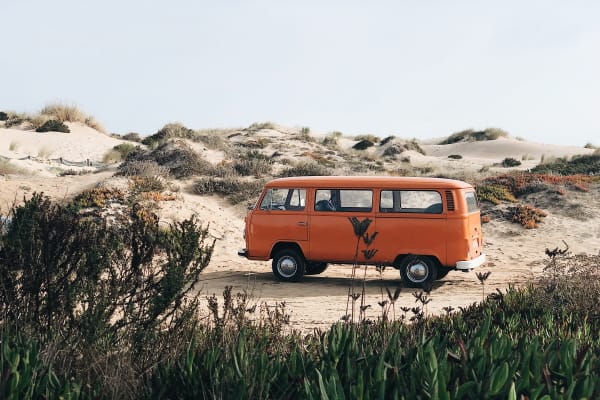
The term boondocking is thrown around a lot online. You’ll see it used when people talk about what they designed their campervan for and you’ll see it used when people name their favorite places to camp.
But what is boondocking? Boondocking means different things to different people but officially it is defined as dispersed camping on public lands. This is one without access to the grid or the sewer system.
Other people define boondocking as any type of free camping that is done without access to the grid or the sewer system. This might include a Walmart parking lot or a spot on a friend’s farm.
In the rest of this post, we’ll talk more about what it means to boondock, why you might want to boondock, and how you might go about boondocking.
Why Boondock With Your Campervan?
Before we talk about how and where to boondock, we should probably talk about why you might want to boondock in the first place. After all, there isn’t any point in learning about boondocking if you don’t have a reason for doing so.
Here are some of the reasons why you might want to go boondocking and some of the reasons why you might not want to go boondocking.
Advantages of Boondocking
- Boondocking is free.
- Boondockers usually have more solitude.
- Boondocking often forces you to do a digital detox.
- Boondockers get access to better views.
- Boondocking can bring you closer to nature.
- A boondocker almost always has a place to stay.
Money Savings
They say the best things in life are free. Boondocking is free. Boondocking must be one of the best things in life.
In all seriousness, boondocking will save you money on campground stays. A dispersed camper can stay in one spot for up to 14 days. When the 14 days are up, they just need to move to a different spot for 14 days. This alternative spot that they migrate to must be outside of a 25-mile radius of the previous location.
Campground stays generally range anywhere from $15.00 to $75.00 a night. Even on the low end, this means a person can save $210.00 by boondocking. On the high end, they could end up saving over a thousand dollars every two weeks.
Solitude
Boondocking spots are usually found deep in the backcountry. These spots don’t have nearly as many people as the campgrounds do and you’ll often find yourself camping alone.
This means you won’t have to worry about noisy neighbors, drunks, or barking dogs interfering with your good time. It also means you get more privacy. This can make for a more romantic camping trip.
Digital Detoxing Benefits of Boondocking
Cellphone reception can be hard to come by in the backcountry. The same holds true for Internet connections as well. This can be a good thing as it forces you to do a digital detox.
According to WebMD, a digital detox can increase your self-image, increase your self-esteem, decrease levels of depression and anxiety, and help improve your sleep. It can even improve your vision and reduce neck and back strain. If these were the only benefits you ever got from boondocking, they’d probably be well worth it.
Boondocking Views
Imagine going on a camping trip only to wake up to a view of your neighbor’s RV, or worse yet, a dumpster. This is what happens to many campers who camp in campgrounds. They end up traveling, only to find themselves with a view that’s worse than the one they had at home.
Now, imagine waking up to an unobstructed view of a mountain or a river. These are the kinds of views that boondockers often experience.
Boondockers Get Up Close With Nature
Boondockers suffer less from light pollution and noise pollution. This gives them a better view of the stars and a better chance to listen to the calming sounds of nature.
These same boondockers are also more likely to see wildlife. The reduced presense of people means that you’re more likely to see animals that you wouldn’t normally see at a campground. This can be especially advantageous to nature photographers, hunters, and anglers.
Boondockers Can Go Anywhere
A boondocker’s campervan will be set up to camp even when there aren’t electric or water hookups. This gives a boondocker more options than other campers. A boondocker can go dispersed camping, but they can also stay in people’s driveways, on the street, in parking lots, and anywhere else they can get away with parking for the night. People who aren’t set up for boondocking don’t have this luxury.
This doesn’t mean boondockers always have to boondock. A camping rig that is set up for boondocking can still function well in a campground. As a result, a boondocker’s options are broader.
Disadvantages of Boondocking
- Boondockers need to be more prepared.
- You won’t have any hookups when you boondock.
- You’ll meet fewer people while boondocking.
- You’ll miss out on recreational facilities while boondocking.
- Help could be far away when you need it the most.
- You may have to go to town more often.
Boondocking Requires More Preparation
A boondocker is going to have to pack all of their own food and water in with them. He’s also going to have to make sure he has enough fuel and power to get him through the trip. Miscalculate on any of these and his life could be in danger.
Boondockers aren’t going to have a ranger to tell them when bad weather or dangerous wildlife has moved into the area. As a result, boondockers need to be prepared for any weather. They also need to be prepared for any potentially dangerous animal encounters.
Boondockers Won’t Find Recreational Facilities and People to Enjoy Them With
A boondocker doesn’t just have to make sure they pack their own fuel, food, and water with them. Boondockers also have to pack their own recreation and friends as well. This is because boondockers can go through an entire trip without ever running into anyone else.
Many people find these drawbacks to be advantages of boondocking but it isn’t so with everyone. Extreme extroverts can find these types of trips challenging and it’s usually best for them to bring a friend or two when they go boondocking.
Trips to Town May Become More Frequent
People traveling in small campervans just aren’t going to be able to bring a lot of supplies with them. In this case, they may find themselves running to town more often. While this isn’t the worst thing in the world, it can reduce the amount of “vacation time” a person actually gets.
To get around this issue, some people will go dispersed camping near towns that they’d like to explore. This makes every trip back to town a fun excursion rather than a burden.
How To Boondock
Boondocking is all about preparation. A boondocker needs to make sure that they will have enough food, water, fuel, and power for their trip. They’ll also need to make sure they know what weather they’ll be traveling through and what types of plants and animals they might encounter on their trip.
On top of this, a boondocker’s vehicle needs to be in top form. A full spare tire should be available and any tools needed to do minor repairs should be available as well.
Going On A Dry Run
My advice for anyone looking to boondock for the first time is to go on a dry run. What I mean by this is that you should go on a trip to a campground or even into your driveway and act as if you’re boondocking. Don’t use any of the hookups and don’t eat or drink anything that you didn’t pack.
While you’re on your dry run, begin to think about what you would do if the weather changed dramatically. Think about how you would deal with a bear or a mountain lion. Consider what would happen if you become injured or sick.
Once you’ve done your dry run and considered all of the possibilities, talk to some people that have been boondocking in the area you’re headed to. Other campers may have had experiences that you might not have considered. They may also be able to give you some tips on how and where to find the best spots too.
Where To Go Boondocking
State and National forests are the most obvious places to go boondocking. You can find these boondocking opportunities throughout the country and they offer some of the best natural views America has to offer.
In some instances, the state will want you to get a permit before you go boondocking. This permit may have a fee associated with it or it may be free. The nice thing about this step is you’ll get to go talk to the local rangers before you venture out. You’ll also be able to let them know where you’re headed and you can ask them to check in on you if they don’t hear back from you within a certain period of time. This way, if you end up stranded somewhere without a way to call for help, you’ll know you just need to wait for your estimated time period to run out.
Choosing a Boondocking Campsite
Once you’ve selected a place to go, you’ll need to choose your campsite. These campsites usually won’t be marked, but you’ll be able to tell which sites have been used as they’ll be flat and they’ll appear to have been camped on before. The Bureau of Land Management would prefer you set up somewhere that has already been camped on as this “avoids creating new disturbances” and reduces the stress on the local environment.
Another thought to keep in mind when choosing a site is the safety of the campsite itself. You’ll want to make sure you park in an area that is unlikely to flood. You’ll also want to make sure you park in an area that is unlikely to be cut off from the road by flooding. While getting stranded on the opposite side of a flood is better than being caught in a flood, it still isn’t the ideal place to be.

The campsite you choose should also be away from hazards such as avalanches, falling rocks, and dying trees. Any of these hazards could lead to serious death or injury and you have to be the one to decide whether these threats can be found at your new campsite or not.
People who boondock out west should also consider the threat of wildfires. Do you have a plan for avoiding and escaping from wildfires? If not, you’d better come up with one before you head out.
My post titled, “Is Tent Camping Safe – What to Watch Out For” can provide you with some additional information on how to avoid the dangers you might face while boondocking.
Summing It All Up
So what is boondocking? Boondocking is a whole lot of fun. It’s also a big potential for danger.
Make sure you plan appropriately so that you can maximize the fun and minimize the danger.
